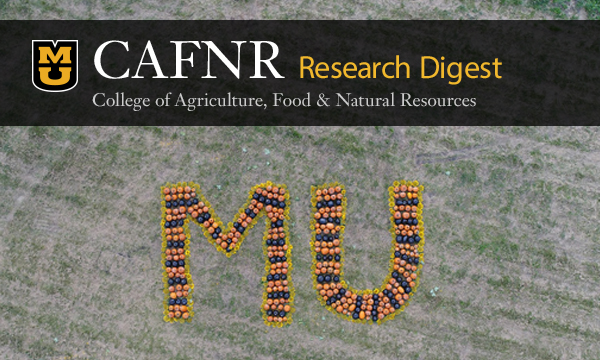|
Mizzou Part of Recent Business Development Grants from USDA Rural Development Twenty organizations statewide, including the University of Missouri, have received funds from the USDA Rural Development’s highly competitive Rural Business Development Grant Program, which partners with businesses to provide funding for expansion, training, technical assistance and other economic development opportunities ensuring Missouri’s rural communities prosper and grow. The grants total over $1 million, and will create jobs and increase economic opportunities. The University of Missouri will use a $100,000 grant as part of this funding to build a commodity barn at our Thompson Research Center in Spickard. CAFNR faculty and staff will use the barn in research identifying ways to increase revenue from beef cattle feedlot operations in the state. Until the middle of April, we included listings of CAFNR faculty who received grant awards. We discontinued this when the official source listing these awards was not available. This resource is available again, so we will return to listing grant awards. The following awards listed were posted in August 2020 (listed by Principal Investigator): Nicole Anderson, Using virtual reality to increase student understanding and interest in farm animal welfare, 9/15/2020-9/14/2023, $270,117, National Institute of Food and Agriculture Stephen H. Anderson, Great Rivers CESU – Soil sample testing for NRCS-IL Soil Survey 68-3A75-18-504, 9/1/2020-6/30/2025, $100,000, Department of Agriculture Bruce Barrett, Acquisition of Goods & Services – Plant Genetics FY20-21, 4/1/2020-3/31/2021, $36,234, Agricultural Research Service Thomas W. Bonnot, Brown-headed Nuthatch Research Technician Support, 7/1/2020-6/30/2021, $37,000, Missouri Department of Conservation Derek Brake, What Effect Does Essential Oil Have On Performance Of Calves Fed A Commercially Available Complete Feed During The Backgrounding Phase? 7/22/2020-12/31/2020, $25,978.62, MFA Inc. Pengyin Chen, Screening and Selecting Non-Xtend Soybeans for Dicamba Tolerance, 7/1/2020-6/30/2021, $65,500, Missouri Soybean Merchandising Council Pengyin Chen, Screening soybean germplasm and breeding soybeans for flood tolerance, 7/1/2020-6/30/2021, $160,000, Missouri Soybean Merchandising Council Daniel Downing, Heartland – Extension Disaster Education Network – Building Resiliency in the Heartland, 9/1/2019-8/31/2021, $97,937, National Institute of Food and Agriculture Christine G. Elsik, Enabling tools for microbiome-based trait selection in dairy cows, 6/15/2020-6/14/2021, $33,411, University of Wisconsin Madison James T. English, Acquisition of Goods and Services – 966 Admin Costs, 4/1/2019-3/31/2020, $1,060, Agricultural Research Service Felix Fritschi, Genetic Analysis and Physiology Studies of Transgenic Soybeans (Glycine max), 1/1/2020-9/30/2020, $39,112, ZEAKAL Inc. Karen Funkenbusch, Missouri AgrAbility Project, 9/1/2018-8/31/2021, $180,000, National Institute of Food and Agriculture Mary K. Hendrickson, Understanding And Overcoming Barriers To Adoption Of Organic Agriculture In The Mid-South, 9/1/2020-8/31/2023, $422,307, National Institute of Food and Agriculture Nicholas Kalaitzandonakes, The Economics and Policies of Genome Editing Technologies in Agriculture and Food, 10/1/2019-9/30/2020, $150,000, Osborn Barr Agency Robert L. Kallenbach, Pesticide Applicator Certification Training, 8/20/2020-8/19/2021, $200,000, Missouri Department of Agriculture Sarah Taylor Lovell, Multifunctional Perennial Cropping Systems for local food and biomass production for small farmers in the Upper Sangamon River Watershed, 8/15/2020-8/14/2022, $186,656, National Institute of Food and Agriculture Matthew C. Lucy, Estradiol and IGF1 Assays and Trenbolone Assay Development, 8/6/2018-8/5/2022, $17,500, ZOETIS Raymond E. Massey, Economic Opportunities from Improved Animal Waste Management, 8/13/2020-12/31/202, $161,921, Department of Agriculture Seth Meyer, COVID19 Impacts on U.S. Ag Commodity Market and Trade, 6/1/2020-6/30/2021, $256,491, Texas A&M University Seth Meyer, Weather extremes, infrastructure, and its impacts on U.S. corn and soybean basis levels, 4/6/2020-7/1/2022, $150,000, Department of Agriculture Gerald Leo Miller Jr., Evaluation of Experimental Kentucky Bluegrass Cultivars from Columbia River Seed for Use in the Transition Zone, 9/1/2020-12/31/2023, $12,000, Columbia River Seed Robert Myers, Improving Soil and Crop Management Decisions With Proximal-Sensing Assessments of Soil Health and Soil Planting Conditions, 9/1/2019-8/31/2021, $52,773, Agricultural Research Service Robert Myers, Technology Transfer and Training for Cover Crops and Soil Health, 12/1/2019-5/31/2021, $284,436, Foundation for Food and Agriculture Research Jamille Palacios Rivera, Revisiting the Drivers of On-Farm Food Loss at the Macro Level, 8/4/2020-8/31/2022, $21,000, Department of Agriculture Randall S. Prather, National Swine Resource and Research Center 18, 8/1/2020-7/31/2021, $1,304,442, NIH Office of the Director Randall S. Prather, National Swine Resource and Research Center COVID Admin Supplement, 8/21/2020-7/31/2021, $499,943, NIH Office of the Director Randall S. Prather, Transgenic Pigs with Red-shifted Channelrhodopsin-Citrine Fusion Proteins, 7/1/2020-6/30/2021, $52,685, University of Florida Jon Simonsen, Enhancing Farmer Resiliency and financial benchmarking diversity through technology inspired delivery and collaborative mentorship, 9/1/2020-8/31/2021, $499,992, National Institute of Food and Agriculture Reid Smeda, Monsanto Service Order #129, 6/1/2020-5/31/2021, $31,920, Monsanto Co. Michael C. Stambaugh, Goats, Smoke, and Oaks: Targeted goat browsing and prescribed fire as a means to halt mesophication and promote biodiversity in Ozark Hardwood Ecosystems, 9/30/2020-9/30/2021, $24,840, Bureau of Land Management Jinglu Tan, Acquisition of Goods and Services-Cropping Systems & Water Quality FY20-21, 4/1/2020-3/31/2021, $45,000, Agricultural Research Service Joanna Whittier, Modeling Water Quality and In-stream Biological Endpoints of Agricultural Conservation in the Mississippi River Basin, $135,318, Department of Agriculture William J. Wiebold, Grape and Wine Institute FY21, 7/1/2020-6/30/2021, $836,203, Missouri Department of Agriculture Jianfeng Zhou, Hay Yield Mapping by Proximal and Remote Sensing, 8/1/2020-7/31/2021, $15,320, Agricultural Research Service Provided by the MU Office of Research |
